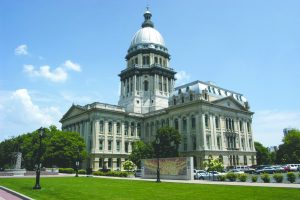Funding and mandates increased for Illinois public schools
By Peter Hancock Capitol News Illinois — June 23, 2019
The big education news in Springfield last week was that schools will get an additional $375 million compared to the current fiscal year through the state’s Evidence Based Funding formula, according to the State Board of Education’s chief financial officer.
SPRINGFIELD — Public schools in Illinois will have a lot of new money to work with in the upcoming fiscal year, along with a host of new laws to implement.
That was the news the Illinois State Board of Education heard June 19 when it received its annual legislative and budget updates.
The big news, according to the board’s chief financial officer, is that schools will get an additional $375 million compared to the current fiscal year through the state’s Evidence Based Funding formula. Of that, $300 million will be distributed in so-called “tier” funding, which means poorly funded systems will get a greater share of the money than wealthier, highly-funded systems.
Lawmakers passed the Evidence Based Funding formula in 2017. Over time, it is intended to provide all school systems with at least 90 percent of the amount that is considered “adequate” to meet their costs. Currently, funding levels range from a low of about 52 percent of adequacy in the Central City School District in Marion County, to a high of 280 percent of adequacy in the Rondout School District in Lake County.
The increase brings the total state appropriation for the formula next year to more than $7.2 billion, a 5.5 percent increase over this year’s funding.
In addition, lawmakers added $50 million for property tax relief grants to eligible school systems.
The budget also provides an additional $50 million for early childhood education, a 10 percent increase over this year’s funding, but only half of the increase that the board had requested. That increase is enough to serve an estimated 4,600 to 5,800 additional children.
It also includes a $5 million increase for career and technical education, and $2 million in new money to help defray the cost of taking Advanced Placement (AP) tests for low-income high school students.
Overall, total general revenue funding for public schools next year will be just under $8.9 billion, which is $498 million or 5.9 percent more than this year’s funding.
Democratic Gov. J.B. Pritzker signed the new budget into law on June 5.
Along with that additional funding, the board’s legislative affairs director, Amanda Elliott, said, will come a host of new laws affecting teachers, prospective new teachers, students and school districts throughout the state. Those bills, however, are still awaiting Pritzker’s signature.
Among those are two competing bills that do away with the “basic skills” test that prospective new teachers have to take in order to be licensed, measures that are intended to alleviate the state’s teacher shortage.
House Bill 423 would suspend the use of that test at least through July 1, 2025, while Senate Bill 1952 would do away with it entirely. The Senate bill also allows student teachers to be paid and it provides that teachers who practice in the lowest-funded Tier 1 districts can apply for refunds for the cost of taking another licensing exam known as the EdTPA test.
Pritzker’s office has said the governor will decide which, if either, of the bills he wants to sign.
Another bill aimed at reducing the state’s teacher shortage is House Bill 1472, which extends for another two years a program that allows retired teachers to return to work in subject-shortage areas without impairing their retirement status or their retirement annuity.
Lawmakers also passed a bill that abolishes the state’s Charter School Commission effective July 1, 2020. Senate Bill 1226 provides that all the duties and functions of that commission will be transferred to the State Board of Education.
Several bills that passed both chambers address student safety and child abuse. Among those was House Bill 3687, which requires prosecutors to immediately notify school districts when a school employee is charged with a sex offense.
House Bill 1475, meanwhile, requires that parents or guardians of students with epilepsy who seek epilepsy-related care at school to submit a “seizure action plan” to the student’s school.
Students would also receive additional legal protections under House Bill 2627, which says students may not be questioned, detained or taken into custody by law enforcement in a school setting in connection with criminal charges or allegations without the presence of the student’s parent or guardian, a school social worker or a licensed mental health professional.
Senate Bill 2124, on the other hand, expands the list of banned items in schools or at school-related activities to include pneumatic guns, spring guns, paint ball guns and BB guns that have specified features. Violation of the law can result in expulsion for not less than one year.
Students also would be required to fill out a Free Application for Federal Student Aid, or FAFSA form, as a condition of graduating high school under House Bill 2719, although the bill does allow students and their families to opt out of the requirement by applying for a waiver from the State Board of Education.
Several bills also address school curricula, including Senate Bill 246, requiring that U.S. history classes in public schools include a study of the roles and contributions of lesbian, gay, bisexual and transgender people in the history of the nation and the state of Illinois.
And House Bill 2265 provides that public elementary schools must include in their sixth, seventh or eighth grade curriculum at least one semester of civics education.
phancock@capitolnewsillinois.com



